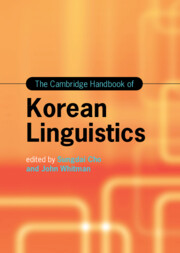Book contents
- The Cambridge Handbook of Korean Linguistics
- Cambridge Handbooks in Language and Linguistics
- The Cambridge Handbook of Korean Linguistics
- Copyright page
- Contents
- Figures
- Tables
- Contributors
- Preface
- Acknowledgments
- Abbreviations
- Part I Korean Overview
- Part II Phonetics and Phonology
- Part III Morphology and Syntax
- Part IV Semantics and Pragmatics
- Part V Sociolinguistics and Psycholinguistics
- Part VI Language Pedagogy
- Chapter 26 The Genre-Based Approach to Korean Language Teaching: A Curriculum Application
- Chapter 27 Towards Integrated Performance Assessment
- Chapter 28 Interactional Competence in the Korean Language
- Chapter 29 From Bilingual Speakers to Korean Heritage Language Learners
- Chapter 30 Language Policy and Its Effect in South Korea
- Index
- References
Chapter 27 - Towards Integrated Performance Assessment
from Part VI - Language Pedagogy
Published online by Cambridge University Press: 30 September 2022
- The Cambridge Handbook of Korean Linguistics
- Cambridge Handbooks in Language and Linguistics
- The Cambridge Handbook of Korean Linguistics
- Copyright page
- Contents
- Figures
- Tables
- Contributors
- Preface
- Acknowledgments
- Abbreviations
- Part I Korean Overview
- Part II Phonetics and Phonology
- Part III Morphology and Syntax
- Part IV Semantics and Pragmatics
- Part V Sociolinguistics and Psycholinguistics
- Part VI Language Pedagogy
- Chapter 26 The Genre-Based Approach to Korean Language Teaching: A Curriculum Application
- Chapter 27 Towards Integrated Performance Assessment
- Chapter 28 Interactional Competence in the Korean Language
- Chapter 29 From Bilingual Speakers to Korean Heritage Language Learners
- Chapter 30 Language Policy and Its Effect in South Korea
- Index
- References
Summary
Chapter 27 stresses the importance of connecting assessment with learning and of assessment prior to implementation of instructional design based on the backward design principle (Wiggins & McTighe, 2005). Backward design contrasts sharply with the traditional approach of planning instructional activities first and designing assessment later in the general instructional process. It also urges teachers to set clear learning objectives as the first step of curriculum design. After offering a short overview of key assessment types for different purposes, it presents Integrated Performance Assessment (IPA: Adair-Hauck, Glisan & Troyan, 2013) model by discussing how language proficiency and skills in real use of grammar and vocabulary can be measured in actual performance assessment. Actual students’ outcomes after implementation of IPA in an Advanced Korean class are collected and analyzed based on rubrics that can be used as standards for scoring. The chapter also analyzes whether there are correlations between IPA results and Proficiency outcomes.
Keywords
- Type
- Chapter
- Information
- The Cambridge Handbook of Korean Linguistics , pp. 769 - 799Publisher: Cambridge University PressPrint publication year: 2022

